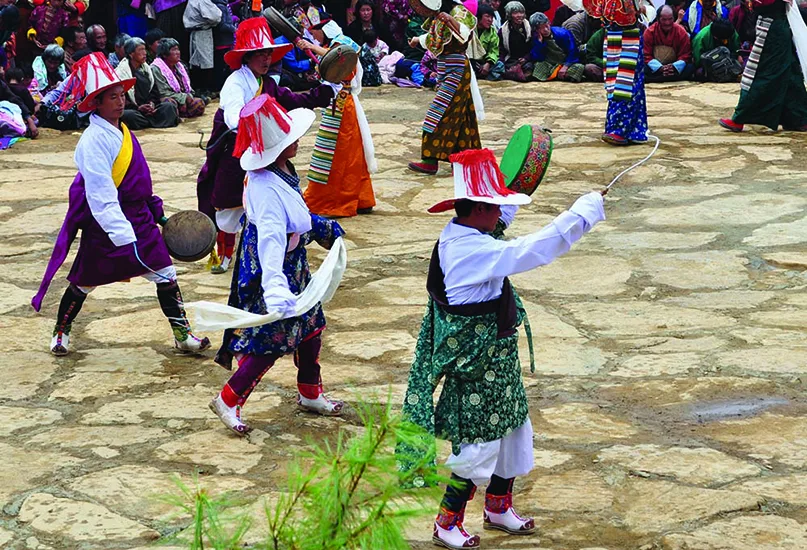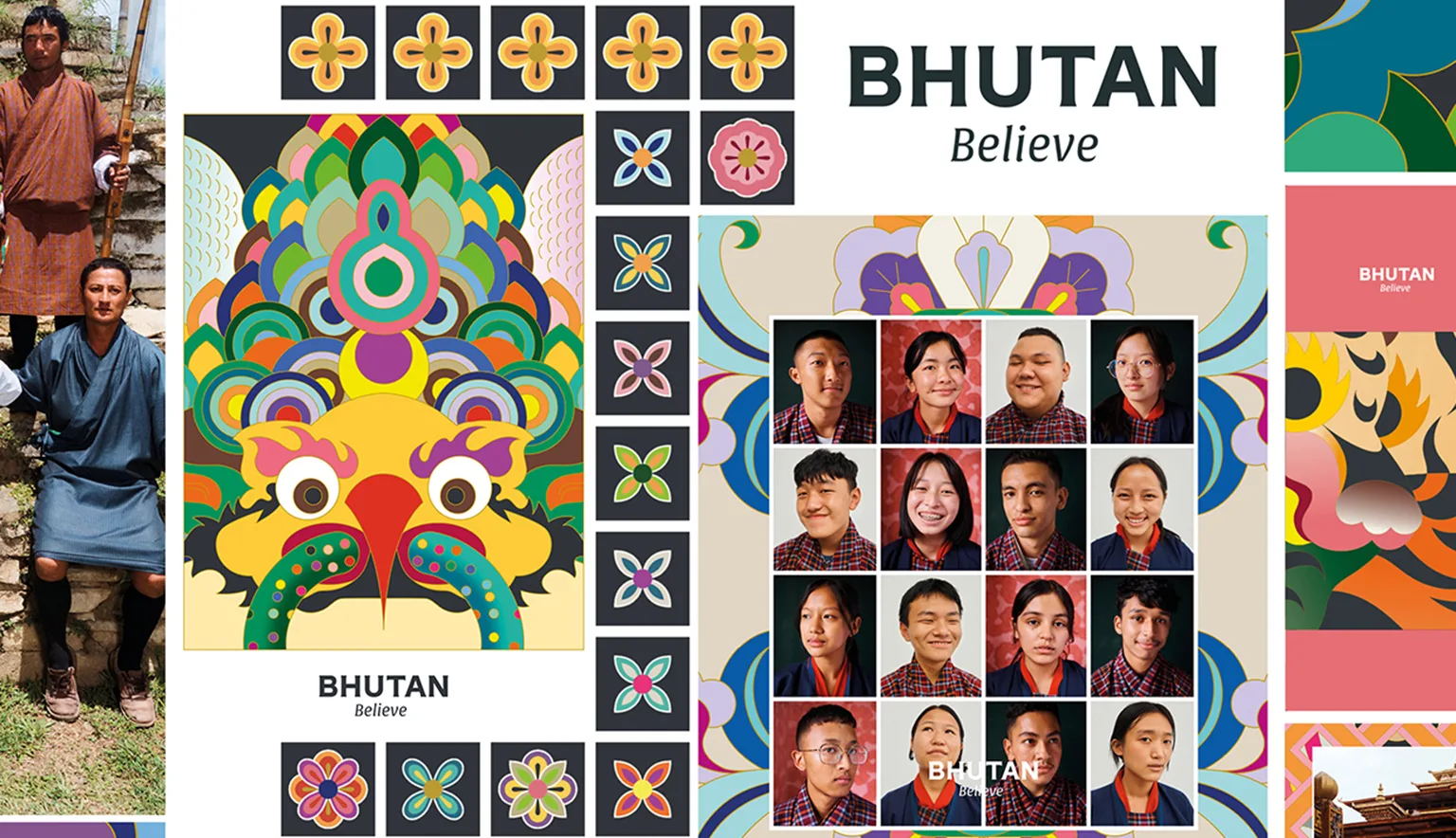Having been initiated in 1971 as a source of revenue and a way to promote the unique Bhutanese culture and rich natural environment, the Department of Tourism of Bhutan proudly develops and promotes sustainable travel experiences in the country for the benefit of the kingdom, its people, and all guests.
Q&A WITH THE DEPARTMENT OF TOURISM BHUTAN
Damcho Rinzin, Director, speaks to us about Bhutan’s reputation as an exclusive travel destination ripe with authenticity, remoteness, and a well-protected cultural heritage and natural landscape, along with the steps the country is taking towards growing its appeal as a bucket-list tourist destination
Firstly, can you talk us through the origins of the Department of Tourism Bhutan and its initial vision?
Damcho Rinzin, Director (DR): The Department of Tourism Bhutan was established in 1971, and the country officially opened to tourism in 1974. From its inception, Bhutan adopted a cautious approach, emphasising regenerative tourism at the core of development guided by the philosophy of ‘high value, low volume’.
The vision for tourism is the same – ‘high value, low volume’, where tourism must make Bhutan better, make the lives of the Bhutanese better, and allow our visitors to transform through tourism.
This has allowed Bhutan to maintain its pristine environment and cultural heritage, earning it a reputation as an exclusive and responsible tourist destination.
What are your organisation’s current goals?
DR: Our current organisational goals focus on elevating Bhutan’s profile as a leading regenerative travel destination, offering distinctive and high-value visitor experiences, and strengthening professionalism and the quality of public service delivery. Ensuring tourism generates high value for the service providers and the nation is also important.
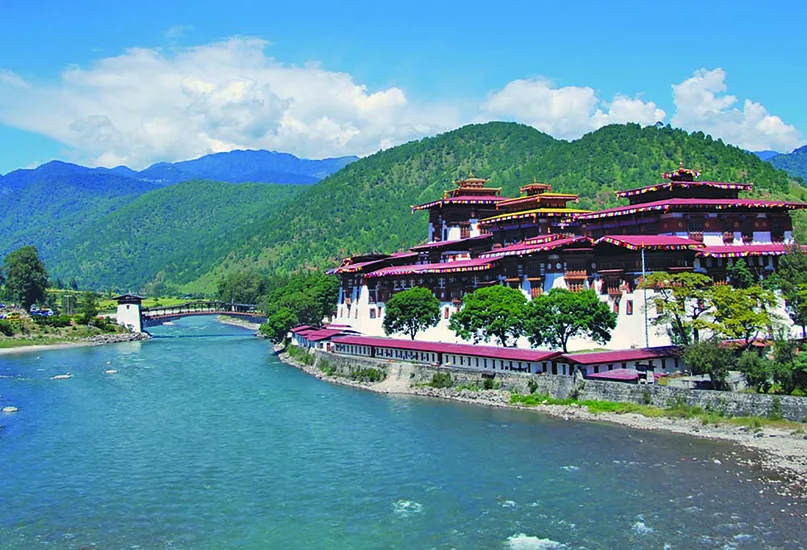
How do you market Bhutan as a destination?
DR: The Department of Tourism Bhutan has been actively engaged in, and continues to carry out, various initiatives to promote and market the country as follows:
- Digital marketing campaigns – The department runs targeted digital marketing campaigns to raise awareness about Bhutan as a tourist destination in key source markets, leveraging various online channels to reach a wide audience.
- Advertising campaigns – Advertising initiatives are undertaken to promote Bhutan in key source markets. These campaigns utilise different mediums such as print, online, social media, and radio advertisements to create visibility and generate interest.
- Events and roadshows in key markets – The department organises events and roadshows in key markets to engage with travel industry professionals, tour operators, and potential visitors. These activities provide opportunities for networking, showcasing Bhutan’s offerings, and building partnerships.
- Promotion of festivals, events, and other activities – The department actively promotes the diverse festivals, events, and activities taking place in Bhutan. This helps create a vibrant image of the country and attracts travellers who are interested in experiencing its cultural celebrations and unique experiences.
- Press releases and public relations – The department regularly issues press releases to share updates and news about Bhutan’s tourism industry. Additionally, we engage in public relations efforts to build relationships with global press and media outlets, facilitating coverage and positive exposure.
- Sales representatives – The department employs sales representatives in key source markets who work to promote Bhutan as a destination and collaborate with travel agents and tour operators in various markets.
- Improvements in content – The department focuses on enhancing the quality and distribution of photography and videography content. By showcasing the hidden stories and captivating aspects of Bhutan, we aim to entice and captivate potential visitors.
- Membership in high-end travel networks – The department has joined exclusive, high-end travel networks like Virtuoso, XO, and Serendipians (Traveller Made). This allows us to tap into luxury travel segments and connect with affluent travellers seeking unique experiences.
- Webinars with sales agents – We have been conducting regular monthly webinars with global travel agents.
- Support for familiarisation trips, press trips, and influencer trips – The department actively supports and plans familiarisation trips, press trips, and influencer trips. These initiatives enable industry professionals, journalists, and influencers to experience Bhutan first-hand and promote it to their respective audiences.
How do you promote off-season travel?
DR: Bhutan is a year-round destination, and all four seasons offer unique opportunities for our visitors.
The department actively promotes Bhutan by highlighting the experiences each season offers, ensuring that visitors can enjoy the country’s rich culture and natural beauty year-round. We also emphasise that every season presents distinct attractions, making Bhutan an ideal destination throughout the year.
Are there any interesting projects in the pipeline you wish to highlight?
DR: We are particularly excited about the development of Gelephu Mindfulness City (GMC), a visionary initiative inspired by His Majesty the King. GMC is an urban development project in Bhutan that aims to blend economic growth with mindfulness, sustainability, and cultural preservation.
Spanning 2,500 square kilometres, it is envisioned as a transformative economic hub that connects Bhutan with Southeast Asian markets, offering a unique model of development rooted in Bhutanese values.
In addition, Bhutan’s tourism sector is embracing transformative trends, including digital innovation and sustainable, diversified travel experiences. A notable initiative is the recent launch of a national-level cryptocurrency payment system in partnership with Binance Pay and Digital Kidu Bank. Introduced in May 2025, this system allows visitors to use cryptocurrencies for a wide range of services, from booking flights and visas to making purchases at local shops.
More than 100 Bhutanese merchants have joined the platform, enabling even small businesses in remote areas to participate in and benefit from tourism. This initiative enhances convenience for travellers and supports Bhutan’s commitment to inclusive economic growth and technological progress.
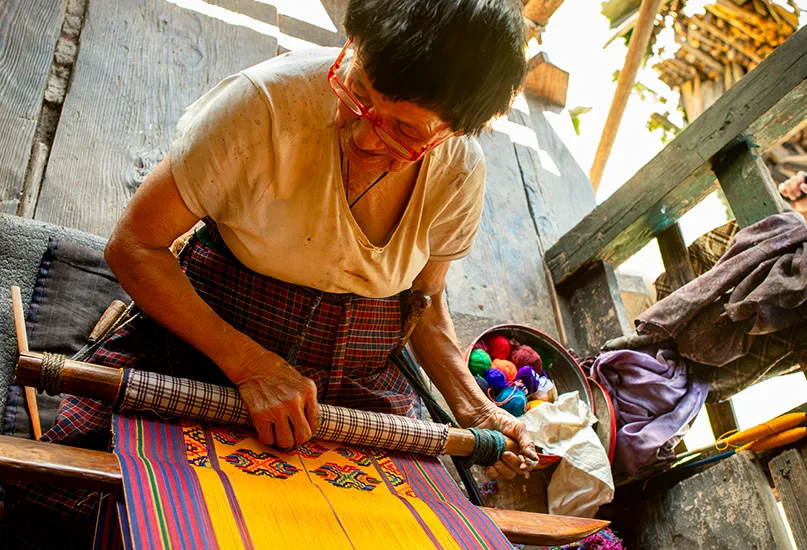
Why, in your opinion, should someone visit Bhutan?
DR: Bhutan is an ideal destination for travellers seeking an authentic and transformative escape from the busy pace of modern life. Known for its commitment to regenerative, sustainable tourism through its ‘high value, low volume’ policy, Bhutan offers opportunities for individuals to explore a country that prioritises quality over quantity and rediscover themselves.
Moreover, visitors can immerse themselves in vibrant cultural traditions, witness stunning festivals, and visit iconic sites like Paro Taktsang, all whilst surrounded by pristine natural landscapes home to rare wildlife.
With over 70 percent forest cover, a deeply spiritual atmosphere rooted in Buddhism, and genuinely warm, welcoming people, Bhutan delivers a wealth of unique experiences – from hot stone baths to rural homestays and artisan crafts. It’s especially appealing to travellers who have seen much of the world and are now looking for something truly meaningful and different.

“Bhutan is an ideal destination for travellers seeking an authentic and transformative escape from the busy pace of modern life”
Damcho Rinzin, Director, Department of Tourism Bhutan
What are some of the country’s most unique landmarks?
DR: Some of the unique landmarks are as follows:
- Haa Valley
The scenic Haa Valley in Western Bhutan, about a three-hour drive from Thimphu, is known for its unspoiled natural beauty, unique cultural heritage, and some of the most stunning hiking trails in the kingdom.
It has comparatively little precipitation throughout summer, ideal for outdoor pursuits like hiking, mountain biking, and monastery visits. Adventure seekers can traverse its picturesque trails, whilst culture enthusiasts can immerse themselves in the valley’s age-old traditions. Haa Valley is recognised as one of the 25 best places to travel in 2025 by BBC Travel. - Paro Taktsang
Paro Taktsang, or the Tiger’s Nest Monastery, is a distinguished Bhutanese monastery famed for drawing international visitors. Perched on a cliff, it overlooks the beautiful Paro Valley. Built in the 16th century, this is not only an important spiritual place but also a must-visit place for every visitor. - Khoma Village
Located in Eastern Bhutan, Khoma in Lhuentse presents travellers with a unique and exciting experience. Well-known for its intricate Kishuthara weaving, visitors can watch local artisans craft exquisite handwoven textiles, a tradition passed down for generations. Additionally, visitors have the opportunity to purchase souvenirs to take back home. - Bumthang
Located in Central Bhutan, Bumthang – often referred to as the ‘Switzerland of Bhutan’ – is one of the picturesque districts with a rich culture, tradition, and natural beauty. The scenic valley promises a blend of spiritual allure and unique attractions for visitors. Bumthang is a seamless blend of nature, tradition, and unique experiences. - Merak and Sakteng Villages
Nestled amidst the majestic peaks of the Himalayas, Merak and Sakteng in Trashigang are two communities with unspoiled natural beauty and rich cultural heritage. Venturing into this highland, travellers are introduced to the unique lifestyle of the highland people. - Punakha Dzong
The majestic fortress of Punakha Dzong is situated at the confluence of two rivers – the Pho Chhu and Mo Chhu. The heritage site is attractive all year, but the beautifully blooming Jacaranda trees make the dzong even more beautiful in the spring. It is one of the most striking and picturesque fortresses in the country.
Captivating as it is on the outside with its whitewashed stone walls and traditional Bhutanese architecture, coupled with a rich historical heritage, Punakha Dzong becomes a favourite of anyone who visits. - Trong Heritage Village
If you want to experience an ancient village setting without travelling far from Zhemgang, visit Trong Heritage Village.
Believed to have existed for more than a century and even predating Zhemgang Dzong, the settlement holds immense historical significance. The village sits on a hilltop and is a testimony to the remarkable architecture and masonry skills of early Bhutanese craftsmen. - Panbang
One of the best adventure and ecotourism destinations in the country, Panbang is a hotspot for thrill-seekers and adrenaline junkies.
Home to Bhutan’s largest river basins, travellers can get their hearts pumping whilst biking, river rafting, and hiking nature trails in subtropical forests. For those who want to enjoy nature at a more relaxed pace, activities like fishing, birdwatching tours, and butterfly tours are also available.
What trends are transforming the tourism industry in Bhutan, and how are you utilising them?
DR: Bhutan’s tourism industry is evolving with a focus on digital innovation, sustainability, and diverse experiences to attract a wider range of travellers.
Key developments include a streamlined online system, improving connectivity, focusing on regenerative tourism, regional development, and year-round travel, and targeting niche markets such as wellness, adventure, and cultural tourism through community-based and immersive experiences.
What challenges does the tourism industry in Bhutan face?
DR: One of the key challenges currently facing Bhutan’s tourism industry is the uneven distribution of visitors through regions and seasons, with the majority travelling to Western Bhutan whilst the eastern areas receive fewer tourists.
To address this imbalance, we are actively developing new and engaging experiences in Eastern Bhutan, alongside ongoing efforts to improve infrastructure and accessibility in the region.
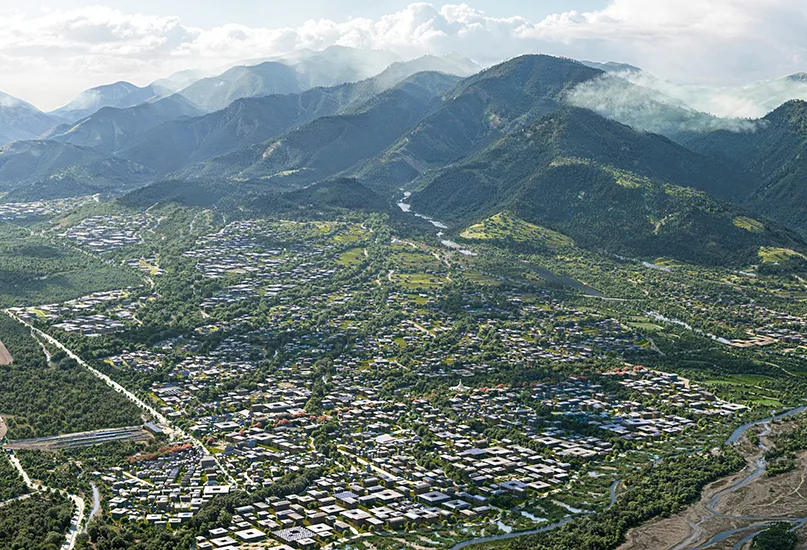
What type of travellers does Bhutan appeal to?
DR: Bhutan warmly welcomes all visitors. A myth exists around Bhutan restricting tourist numbers or putting a cap on the number; there are no restrictions on visiting Bhutan. We encourage those who share our values to experience the unique culture, natural beauty, and mindful travel that the country has to offer.
Travelling to Bhutan is easy. Visitors can:
- Apply for a visa online in just a few clicks.
- Customise and plan their trips with certified tour operators.
- Access a range of services, including tour operators, accommodations, and guides at services.bhutan.travel.
Bhutan offers something for everyone, no matter the season:
- Spring (March – May) – Rhododendron blooms and vibrant festivals.
- Summer (June – August) – Lush green valleys, cultural immersions, and fewer crowds.
- Autumn (September – November) – Clear skies, trekking, and major festivals like Thimphu Tshechu.
- Winter (December – February) – Viewing Himalayan ranges, spotting black-necked cranes, and peaceful retreats.
Whether you’re a hiker, spiritual seeker, nature lover, or culture enthusiast, Bhutan welcomes you all year long.
Bhutan is more accessible than ever with improved regional and international air links. A key focus in 2025 is the newly launched Dubai–Paro connection, offering easier access from Europe, the Americas, the Middle East, and beyond.
A destination for every type of traveller
Bhutan is redefining its offerings to cater to diverse interests, including:
- Luxury and wellness retreats.
- Soft and adventure trekking.
- Cultural heritage and immersive experiences.
- Family-friendly programmes and accessible travel for seniors.
- Creative journeys through cuisine, textiles, and traditional arts.
Sustainable and safe travel experience
As the world’s only carbon-negative country, Bhutan ensures your visit supports conservation and community well-being:
- Tourism is ‘high-value, low-volume’ by design.
- Safety, cleanliness, and cultural integrity are top priorities
- Travel contributes directly to education, healthcare, and infrastructure for the Bhutanese people
Finally, are you optimistic about the future of the tourism industry in Bhutan?
DR: Yes, we are highly optimistic about the future of Bhutan’s tourism industry. A major source of this optimism is the upcoming GMC project, where tourism is a central focus.
We believe this visionary initiative will significantly enhance Bhutan’s appeal as a destination, attract more visitors in the years to come, and enable us to offer truly exceptional and meaningful experiences to travellers.
